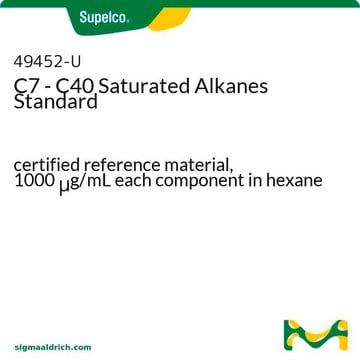All Photos(1)
About This Item
Linear Formula:
CH3(CH2)24CH3
CAS Number:
Molecular Weight:
366.71
Beilstein:
1705609
MDL number:
UNSPSC Code:
12352100
PubChem Substance ID:
NACRES:
NA.22
Recommended Products
Quality Level
Assay
99%
form
solid
mp
55-58 °C (lit.)
SMILES string
CCCCCCCCCCCCCCCCCCCCCCCCCC
InChI
1S/C26H54/c1-3-5-7-9-11-13-15-17-19-21-23-25-26-24-22-20-18-16-14-12-10-8-6-4-2/h3-26H2,1-2H3
InChI key
HMSWAIKSFDFLKN-UHFFFAOYSA-N
Looking for similar products? Visit Product Comparison Guide
General description
Hexacosane is one of the important component of the essential oil of Moringa oleifera (Moringaceae).
Application
Hexacosane can be used:
- To prepare sulfonated hexacosanes, which are used as phase-change materials in the latent heat thermal energy storage process.
- As a model n-alkane to study the solid-liquid equilibrium of binary mixtures in N,N-dimethylacetamide and N,N-dimethylformamide.
Storage Class Code
11 - Combustible Solids
WGK
WGK 3
Flash Point(F)
Not applicable
Flash Point(C)
Not applicable
Personal Protective Equipment
dust mask type N95 (US), Eyeshields, Gloves
Choose from one of the most recent versions:
Already Own This Product?
Find documentation for the products that you have recently purchased in the Document Library.
Customers Also Viewed
Solid-liquid equilibria of long chain n-alkanes (C18-C28) in n, n-dimethylacetamide
Sekhar GC, et al.
Fluid Phase Equilibria, 201, 219-231 (2002)
Enthalpy of melting and solidification of sulfonated paraffins as phase change materials for thermal energy storage
Alkan C
Thermochimica Acta, 451, 126-130 (2006)
Solid-Liquid Equilibria of n-Alkanes in N,N-Dimethylformamide
Venkatesu P, et al.
Journal of Chemical and Engineering Data, 45, 177-181 (2000)
Benjamin Savage et al.
Journal of chemical ecology, 47(7), 628-641 (2021-06-24)
Cuticular hydrocarbons (CHCs) are important, multi-function components of the insect epicuticle. In Drosophila spp., CHCs provide protection from desiccation and serve as semiochemicals for both intra- and interspecific communication. We developed a non-lethal method for the modification of Drosophila CHCs
Tatiana Marrufo et al.
Molecules (Basel, Switzerland), 18(9), 10989-11000 (2013-09-12)
The antioxidant capacity and antimicrobial activity of the essential oil of Moringa oleifera (Moringaceae) grown in Mozambique was investigated. The chemical composition was studied by means of GC and GC-MS analysis. Hexacosane (13.9%), pentacosane (13.3%) and heptacosane (11.4%) were the
Protocols
Separation of Decane; Dodecane; Tetradecane; Hexadecane; Octadecane; Eicosane; Docosane; Tetracosane; Hexacosane; Octacosane
Our team of scientists has experience in all areas of research including Life Science, Material Science, Chemical Synthesis, Chromatography, Analytical and many others.
Contact Technical Service















